
This past weekend, I was once again honored to be invited onto the Polycast podcast about the Civilization games. This was my third time on the show since the release of Civilization VI (back in November). Those two episodes were focused more about initial impressions of the game. This time, we got to have some more substantive discussions.
The 1-hour archive of the episode can be streamed from civcomm.civfanatics.com/polycast/polycast/season9/episode223.mp3:
This archived episode is edited down to 1 hour (from a 2-hour recording), so not all the following topics may be included in this particular episode. The remaining topics may be included in later episodes, so be sure to check back at Polycast.net if you want to hear it all!
The bulk of our discussions were focused around a handful of Civfanatics forum topics regarding criticisms and suggestions for enhancing the district mechanics. The first thread was about users' ideas for possible districts in any inevitable expansion for the game. This gave me an opportunity to link back to a previous blog that I had written about my own ideas for new districts (and other ways to make better use of the game's map). Ideas from other users ranged from new districts focused around diplomacy and envoy-generation, to railroad hub districts, a fortress / castle district, espionage district, and (of course) a canal district. Other users pitched the idea of stacking multiple districts into a single tile. This idea seemed unfavorable to the Polycast hosts (as well as myself), as it generally undercuts the fact that "unstacking" cities was a core design philosophy of Civ VI. However, it is worth pointing out that "unstacking" units was the core design philosophy of Civ V, but Civ VI added limited stacking back into the series. So back-pedaling on a philosophy of unstacking is not without precedent.
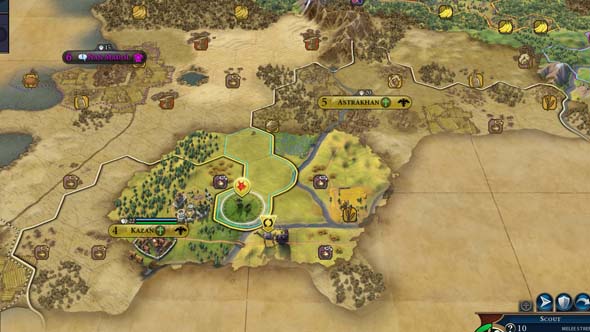
Russia is pretty much the only A.I. that places its districts well, due to its free extra border expansion.
The next topic was a thread about removing districts. The general consensus seemed to be that we were all in favor of having a city project to remove or relocate districts, if -- for nothing else -- but to relocate poorly-placed districts in captured A.I. cities. The last forum topic discussion was about user dunkleosteus' ideas about rethinking districts. I think we all agreed that the poster's ideas seemed to be far too complicated, but there are some ideas of merit in there. Having more options for further specializing districts and cities would be fine, and we'd all like to see more bonuses based on nearby districts and the map so that district placement doesn't feel quite so ... mechanical... [More]
47ec6e63-fca3-483e-8260-ed72b3b0b7f6|0|.0
Tags:Civilization, Sid Meier's Civilization, Civilization V, Civilization VI, PolyCast, Firaxis, podcast, DanQ, Makahlua, TheMeInTeam, MadDjinn

In their single-midned insistence on making all of their movies about epic showdowns between the superheroes and some big bad guy, the DC movies have consistently failed at depicting their heroes as having any particular desire or inclination to actually help people. This is perhaps the greatest failing of the Zack Snyder / Henry Cavill Superman movies and the greatest strength of the classic Richard Donner / Christopher Reeve Superman films: Snyder's / Cavill's Superman seems to treat saving people as a begrudging chore that he's obligated to do; whereas the classic Donner / Reeve Superman put on a charming smile and went out there to do good for the sake of doing good, simply because he is capable of doing good.
Well now, DC seems to have finally realized that the primary role of its superheroes is to be idealistic saviors and protectors. For the first time in the DCEU movies, our hero shows the idealistic optimism and desire to help people and do good that has been the trademark of the classic Superman films and the Spider-Man films (heck, even Amazing Spider-Man 2 got that right). But in this case, our hero isn't Superman or Spider-Man; our hero is Wonder Woman.
I actually don't mind the darker aesthetic and tone that DC has adopted for its movies. The problem so far has been that those movies have been dark and poorly-written and thought-out. Wonder Woman, on the other hand, is a much brighter movie (both in terms of visuals and thematic tone), and benefits from much tighter writing. The script is solid and tightly-themed, Wonder Woman has a full and nuanced character arc, the performances are good, the action looks slick, and (most importantly) it's easy to follow along with what's happening.
The biggest failing of the Zack Snyder / Henry Cavill Superman is that he seems to be begrudgingly helping people,
instead of happily doing good for the sake of doing good (as in the Richard Donner / Christopher Reeves Superman).
Gal Gadot provides a great performance that proves that her stealing the show in Batman v Superman wasn't just a fluke or a simple sign of how bad the rest of that movie was. She actually works well in this role and is almost as charming a Wonder Woman as Christopher Reeve was at being Superman. The supporting cast mostly works, and this is probably the best role that I've seen for Chris Pine to date. Some of the secondary characters are a bit under-written and lack screen time, but everyone (no matter how minimal their screen-time) has a role to play that helps shape Diana as a character. There's no superfluous characters like Louis Lane in either of Snyder's Superman movies. The only exception being, maybe, Steve Trevor's secretary, who actually deserved a lot more screen-time that she received.
Even Doctor Poison seemed to have a little bit of complexity and nuance to her character. She does suffer from some poor, underwritten motivation, as the movie never really seemed to go too deep into why she's doing what she's doing. But it's definitely apparent that there's something going on under the surface, beyond simply being manipulated by higher forces. The closest that I could figure is that she has some kind of relationship with General Ludendorff and is blindly loyal to him, but she at least wasn't a bad guy for the sake of being a bad guy.
Hits and misses
The only major weakness of Wonder Woman, as a movie, is that it's a bit of an uneven work. It's broken down into a readily discernible three-act structure. The first act is great, the second act is okay, and the third act sinks towards the DC stamp of terribleness. The unfortunate thing about this is that I walked out of the theater with a bad taste in my mouth, even though the movie was still mostly pretty good. So far, DC's movies have all started out mediocre and progressed towards terrible by the end. Wonder Woman, however, starts out good and starts to sink in the direction of bad at the very end. Which, I guess is a big improvement.

Act II concludes with Wonder Woman getting her first real "hero shot" in the movie.
The first act, set on the island of the Amazons, is colorful and vibrant. It's beautifully shot, with interesting and well-choreographed action sequences, and sprinkles of humor. If you didn't know better, you might be justified in mistaking it for a Marvel movie... [More]
40842c3b-0456-4b21-81c3-4fd9a6e449a8|0|.0
Tags:Wonder Woman, DC Comics, Gal Gadot, Diana Prince, Doctor Poison, Steve Trevor, Zeus, Ares, God of War, Amazon, Chris Pine, World War I, Germany, trench warfare, chemical weapon, mythology, Patty Jenkins, Zack Snyder

In my last post, I ranted a little bit about some of the major frustrations that I have with the way that Civilization games have historically dealt with difficulty levels. In summary, I identified three problems that I feel make it less enjoyable to play the game on higher difficulties, even if the lower difficulties still feel too easy. The three problems are:
In this post, I'd like to provide some more constructive criticism by discussing some of the thoughts and ideas that I've had for possibly resolving these three problems. These ideas include providing a wider range of options for customizing the difficulty level and game experience to suit the individual player's tastes and style, and to provide a wider (and more open-ended) set of game-long challenges.
Alternative solutions to game difficulty
So what could the developers do about these problems?
Well, the problem of game pacing could possibly be solved by inverting the handicap such that instead of speeding up the A.I.s' progress through the game, the player is slowed down. This could be accomplished by slowing down the human player's tech and civic progress, and by negatively handicapping some of the human player's yields. This would allow the A.I.s to progress at a more historically-appropriate rate, and overall game length would remain similar across all difficulties.
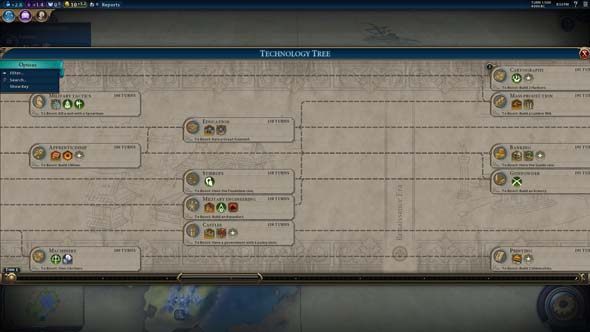
Padding out sparse areas of the tech and civics trees could mitigate the ability to beeline to later eras.
Rapid era progression could also be somewhat mitigated by padding out the tech and civics trees a little bit more. Beelining to the Renaissance via the "Cartography" technology is common for civs like England and Norway. There's a few ways to limit this. One simple way would be to simply make "Cartography" require either "Education" or "Military Tactics". Another way would be to have a technology between "Ship Building" and "Cartography" -- such as an "Optics" technology that unlocks an upgrade to the Scout, or a "Lateen Sail" technology that unlocks a medieval naval unit like the Cog, Hulk, Junk, or Galleass (or move the Caravel up to "Lateen Sails" but don't give it ocean-crossing abilities until "Cartography").
Customization, options, and difficulty settings
As for resolving the other issues presented by high difficulty levels, my preference would be for the developers to add more customization and tuning options for players so that we can tailor the gameplay experience and challenges more to our liking.

Civ VI has limited customization options.
Having independent sliders or settings for things like Player Handicaps, A.I. Handicaps, AI Temperament, Barbarian Spawn Rate, Barbarian Aggressiveness, Barbarian Tech Level, City State Aggressiveness, and so on would all go a long way towards allowing the player to customize the game's challenge according to their own strengths and weaknesses. Handicap settings for players and A.I. can even be further divided into different sub-categories along the lines of: Tech Handicap, Culture Handicap, Production Handicap, Gold Handicap, Growth Handicap, Happiness / Amenity Handicap, etc.. So if you find that you are consistently out-teching your A.I. opponents, but you feel you have parity with the A.I. in other areas of the game, then you could specifically buff the A.I.'s tech handicap, weaken yours, or both.
This would certainly make some of the game's code more complicated, but I don't think that it would be prohibitively difficult. The difficulty settings already make adjustments to these very same parameters, and I believe the game's own .ini files allow modders to customize many (if not all) of these attributes. I don't see any reason why such settings can't just be in the game's settings menu, and the difficulty settings (deity, emperor, king, settler, etc.) could just use some pre-configured arrangements of those values.
Other genres use similar paradigms for their difficulty settings. Sports games are a prime example... [More]
b6248b6f-1a24-40b9-86ea-99aa3b364e61|4|5.0
Tags:Sid Meier's Civilization, Civilization V, Civilization VI, Firaxis, strategy, grand strategy, difficulty, artificial intelligence, climate, politics, demographics, quest, Civilization: Beyond Earth, Madden NFL, NBA 2k16

Obviously, I love the Sid Meier's Civilization game franchise. I've been playing it since Civ III, and even own the Fantasy Flight board game (which I also really like). This game series has kept me up, one-more-turning, into the wee hours of the morning on many occasions. Despite my love for the games, this series can also really grind my gears sometimes.
One of my persistent frustrations with the Civilization series of games is the way that it handles difficulty levels. Granted, this seems to be a common issue in all strategy games, so Civ is certainly not unique in this frustration. Basically, the higher difficulties don't make the A.I.s play better; rather, it just gives them free stuff at the beginning of the game, and buffs their production, research, and so on. The free stuff includes (depending on the difficulty level selected): extra settlers, extra military units, free workers/builders, free technologies, extra gold, extra population in its starting city, and so forth.
There's three key problems with this design paradigm:
- It front-loads the challenge in a game that is supposed to have very long play-sessions
- It limits player options
- It rushes the pace of the game
The front-loading of frustration
Giving the A.I.s extra stuff at the beginning of the game only makes the game harder by giving the A.I.s a handicap - a head start. It doesn't make the A.I.s better - or the game harder - in the long run. The A.I.s still chose crappy locations for those extra settlers to plant their cities - often putting them in un-productive locations, or (in the case of Civ VI) putting them so close together that they can't fit enough districts in. The A.I. doesn't plan ahead regarding where its districts will be, and it often places those districts in sub-optimal locations. "Sub-optimal" being an understatement.
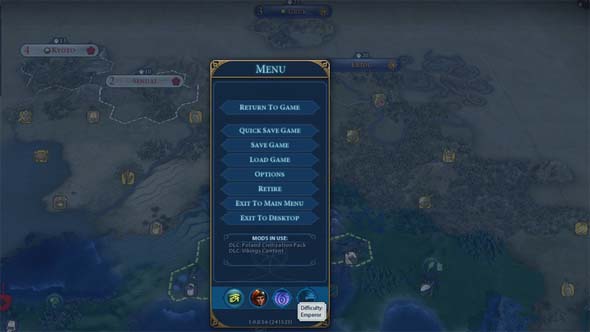
The A.I. starting with extra settlers on high difficulties doesn't make the game harder in the long run.
Those free extra units aren't used more effectively either. Even with a few extra warriors, the A.I. still can't plan or execute a city siege, as it's generally inept at handling the one-unit-per-tile, hex-based combat, and they rarely bother to escort their civilian units. The developers can't be completely blamed for this, as A.I. for tactical combat is a very difficult problem to solve. Most games that have A.I.-driven tactical combat either don't have any grand strategy at all (as in Panzer General), or the grand strategy is separated into a completely different layer of gameplay (as in Total War).
Once the human player can get his or her cities up and running, get a sizable military built, and start conquering the A.I., all these free starting units become moot. These extra units can even backfire. A.I. cities can usually easily be captured by the human player. Since the A.I. gets buffs towards population growth, production, and other yields, those cities tend to grow faster than the player's cities anyway. So if they're conquered, then the human player gets better cities than they could have founded on their own, and gets them sooner than if they had spent the time to build their own settlers.
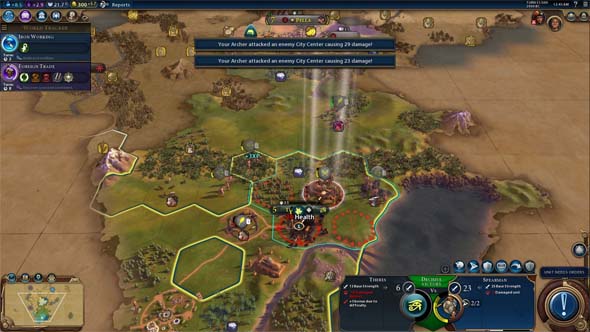
It's not hard to capture A.I. cities, which are often larger and more developed
than any city the player could have founded within the same amount of time.
These early hurdles aren't that difficult to overcome, and once the A.I.'s starting advantages have been neutralized, they don't pose much of an increased threat long-term... [More]
a8515e12-0c08-4e01-a801-df49acf76d91|5|5.0
Tags:Sid Meier's Civilization, Civilization V, Civilization VI, Firaxis, strategy, grand strategy, difficulty, tactics, artificial intelligence, hex, handicap, wonder, eras, technology

I really enjoy the Star Wars: X-Wing miniatures game, and have been playing it on and off for a few years now. Unfortunately, the core set is very lacking in variety, and so the game really needs to be expanded in order to be fully enjoyed. There's a myriad of expansions available, and they can be pricey. A single fighter ship expansion retails for $15, large ship expansions retail for $30-50, and the huge (epic) ships can cost as much as $90 or $100! If you get into this game, be prepared to spend money.
I never got into much of the Star Wars extended universe, so my interest in expansion ships has been mostly limited to content from the classic trilogy. This allowed me to be at least somewhat frugal in my early expansion purchases, but I still tried to find as much variety as I could. At the time of this review, I own (and have played with) the following expansion: Millennium Falcon, Slave I, Lambda Shuttle, VT-49 Decimator, X-Wing, A-Wing, TIE Fighter, TIE Advance, TIE Interceptor.
I also recently purchased the Corellian Corvette expansion (the foot-long huge ship that stands on two bases), but I've yet to have a chance to play it. I'm also interested in trying out the Imperial Raider, which (as I understand) is a ship that was conceived for the X-Wing miniatures game and then also ported into Armada. I also haven't played the "Most Wanted" expansion, which adds a third faction and could hypothetically allow for three-player games. I don't think that there's an official ruleset for a three-player deathmatch though, so even with a third faction, you'd probably just be playing in teams.
Small ships (fighters)
There's really not much to be said about the small fighter expansions, as they play (mostly) the same as the X-Wings and TIE Fighters that come packaged with the core set. Each ship comes with its own special abilities that add some nuanced differences to how they play, but they still play similarly at fundamental levels.
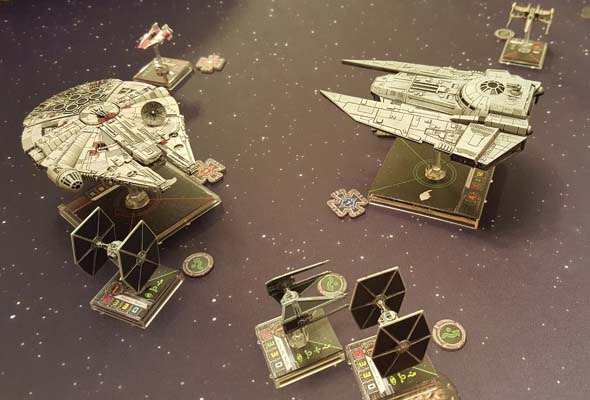
Be very aware of each ship's Pilot Skill, as the risk of collisions dramatically increases with more ships.
The biggest change (and most obvious ones) is that they allow for larger fleet sizes, which complicates the board and requires more careful management of your ships. With more ships in play, you have to be much more aware of what ships are where, what their respective pilot skills are (e.g. their turn order), and what kind of movements and abilities each possesses. Collisions become much more frequent and harder to avoid as more ships are added, and a careless player will probably also find themself running their own ships into each other -- especially if you're trying to fly tightly-packed formations. Of course, I've never run my own ships into each other ...
Perhaps the most obvious expansion is stand-alone X-Wings and TIE Fighters. These are a little bit more than a simple repackaging of the core game's components... [More]
335e38fd-7d74-43a5-be9f-9b9da0b74b65|0|.0
Tags:Star Wars, Star Wars: X-Wing, Fantasy Flight, board game, expansion, miniatures game, dogfighting, Millennium Falcon, Han Solo, Chewbacca, Lando Calrissian, YT-1300, Slave I, Boba Fett, Lambda Shuttle, VT-49 Decimator, X-Wing, Wedge Antilles, A-Wing, TIE Fighter, TIE Advanced, Darth Vader, TIE Interceptor, weapon arc, dice
|

| 12 | | | | | | | 60 | | 11 | | | | | | | 55 | | 10 | | | | | | | 50 | | 09 | | | | | | | 45 | | 08 | | | | | | | 40 | | 07 | | | | | | | 35 | | 06 | | | | | | | 30 | | 05 | | | | | | | 25 | | 04 | | | | | | | 20 | | 03 | | | | | | | 15 | | 02 | | | | | | | 10 | | 01 | | | | | | | 05 |
|